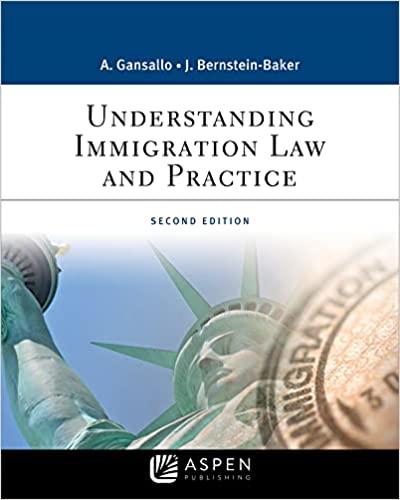Question
Glenn Affleck and Pat Damon are professional gamblers. Last summer, they traveled from their residences in Las Vegas, Nevada to casinos in New Jersey and
Glenn Affleck and Pat Damon are professional gamblers. Last summer, they traveled from their residences in Las Vegas, Nevada to casinos in New Jersey and Puerto Rico. On August 8, they flew home from San Juan (Puerto Rico), taking a connecting flight through Atlanta, Georgia. They had about $97,000. In their possession.
This case was discovered during a security screening in San Juan and Affleck was questioned by DEA agents before boarding the plane. After taking the initial flight and arriving in Atlanta, Affleck was questioned by Agent Sealy Booth and another DEA agent. After ten minutes of questioning, another DEA agent arrive with a drug-detecting dog. The dog did not react to Affleck's carry-on bag but pawed at Damon's bag once. The agents informed Affleck and Damon that the dog's reaction sufficiently signaled contraband to indicate that the money was involved in drug transactions and seized all of the funds.
Affleck and Damon flew home to Las Vegas, albeit without their money. Subsequently, they sent documents to Agent Booth showing that the monies were legitimate gambling proceeds but the funds nevertheless were not returned to them. Instead, the matter was forwarded to DEA headquarters in Virginia for additional investigation. Ultimately, a federal prosecutor in Georgia decided there was no "probable cause" (a subject we will soon discuss) for the government to retain the funds and therefore instructed the DEA to return the $97,000. to Affleck and Damon.
Even though the funds were returned to them, Affleck and Damon decided to sue Booth and three other unnamed government officials for violating their rights (4th Amendment, in fact). The principal contention in their 4th Amendment claim was that the DEA and government officials' seizure of their money on August 8 at the airport was without "probable cause" (more on this to follow!). They asserted that the defendants' misconduct after the seizure-essentially acting to hold on to the money for almost a year, despite being provided with conclusive evidence that the money was not contraband-violated the 4th Amendment as well.
The plaintiffs, Affleck and Damon, have filed their lawsuit in the United States District Court in Nevada, where they reside. Booth, the only named defendant in the suit, filed a motion to dismiss the lawsuit for lack of personal jurisdiction.
Booth's lawyers appear in the district court and argue that because the seizure occurred in Georgia and was "expressly aimed at Georgia", the federal district court does not have personal jurisdiction over him and thus the court should dismiss the lawsuit. If the plaintiffs wish to sue him, Booth maintains, they could do so in Georgia.
The district court has granted the motion to dismiss, effectively ending the lawsuit in Nevada. Affleck and Damon, instead of pursuing Booth in Georgia, appealed the court's decision to the Circuit Court of Appeals and the Court of Appeals reversed the district court. In the decision, the panel emphasized that the plaintiffs' claim encompassed more than the initial seizure in Georgia. Significantly, the court reasoned that the plaintiffs were Nevada residents and alleged that "after they forwarded their documentation, Booth likely knew...that Affleck and Damon were professional gamblers and their seizing and attempting to keep their money would disrupt their business activities".
Under the Ninth Circuit panel's reading of the law, the plaintiffs could continue with their lawsuit in Nevada because Booth's actions in Georgia "individually targeted Affleck and Damon in Nevada, and thus were expressly aimed at Nevada", causing them foreseeable harm in Nevada.
After failing to persuade the entire Ninth Circuit to revisit the panel decision, Booth has filed a "petition for certiorari" in the U.S. Supreme Court. The Supreme Court 's order granting the petition stated that the parties should address the issue of "whether due process permits a court to exercise personal jurisdiction over a defendant whose sole "contact" with the forum State is his knowledge that the plaintiff has connections to that State".
At oral argument, the Court heard arguments on behalf of Booth from his counsel and the United States Department of Justice, as an amicus curiae ("friend of the court) as well as assistant Solicitor General. The argument focused on the fact that the misconduct complained of by the plaintiffs occurred in Georgia and that the case was centered in that state; any effects of the defendant's actions were felt by the plaintiffs in Nevada were too attenuated to support personal jurisdiction over Booth in that state.
Attorneys for the plaintiff did not emphasize the facts of the case, but instead with the consequences of the Court's decisions in other cases (precedent?). What Affleck and Damon's case was about, counsel suggested, was Internet commerce. If the Court rules that Nevada did not have personal jurisdiction over Booth, then anyone who was the victim of a fraudulent scheme that was conducted over the Internet would not be able to sue the perpetrator of the fraud in their home state, but instead would have to sue the perpetrator in that person's state.
As the contrasting approaches of each side suggest, it may be difficult for the Court to articulate a general rule in deciding the case. You are the newest member of the United States Supreme Court (congrats on your appointment!). Render your written decision, Your Honor, based upon the facts of the case before it or, address the Internet case issue at a later date(?) This important issue rests on your shoulders!
Step by Step Solution
There are 3 Steps involved in it
Step: 1

Get Instant Access to Expert-Tailored Solutions
See step-by-step solutions with expert insights and AI powered tools for academic success
Step: 2

Step: 3

Ace Your Homework with AI
Get the answers you need in no time with our AI-driven, step-by-step assistance
Get Started


